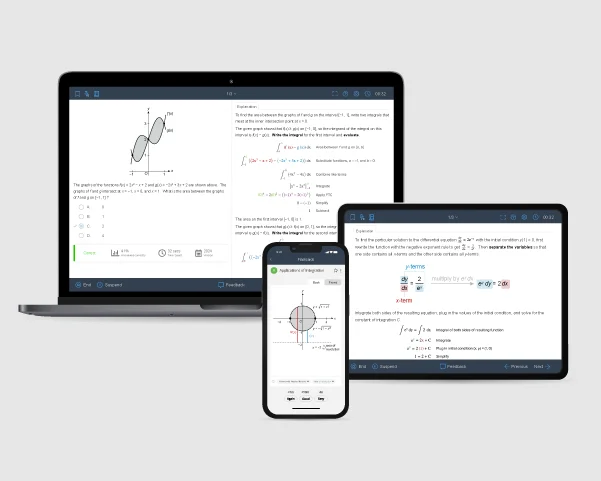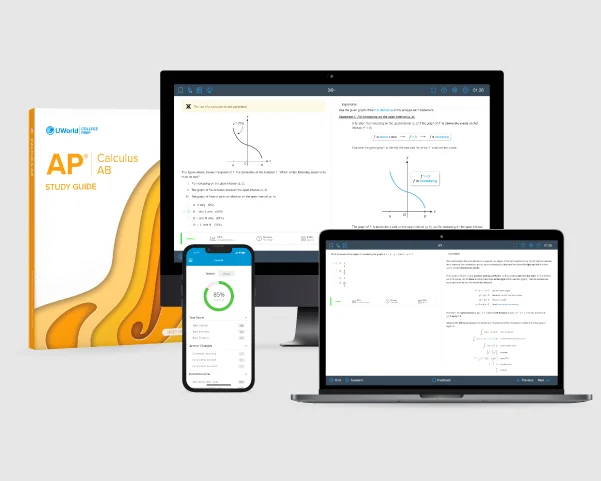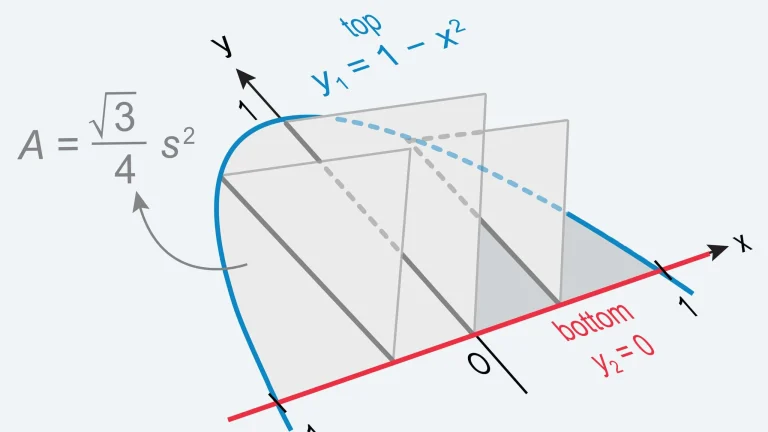If you are taking the AP Calc AB exam soon and are curious about how it is scored, you’ve come to the right place. This is your guide to the AP Calculus AB scoring system.
How Is the AP Calculus AB Exam Scored?
AP Calculus AB exam consists of two sections: multiple-choice questions (MCQs) and free-response questions (FRQs). Section I includes 45 MCQs, while Section II consists of 6 FRQs or long-answer questions. Each section accounts for 50% of the total composite score.
| Sections | Part A | Part B | Total Questions | Total Time | ||
|---|---|---|---|---|---|---|
| Section I | 30 | 60 mins | 15 | 45 mins | 45 MCQs | 1 hour 45 mins |
| Section II | 2 | 30 mins | 4 | 60 mins | 6 FRQs | 1 hour 30 mins |
AP Calculus AB Raw Score Conversion
Your final score is determined by the number of correct points earned. This composite score is then converted into a score on the AP scale, which ranges from 1 to 5. Please note that the College Board® keeps the conversion process confidential, so your composite score on the AP Exam will not be publicly disclosed.
Considering these AP Calculus AB scoring guidelines, let's examine how your AP scores can impact your college applications, including recommendations, placements, and college credits.
To further strengthen your preparation and deepen your understanding of key concepts, our AP Calculus Study Guide is an invaluable resource. Available in both print and e-book formats, this guide walks you through each topic systematically, making complex concepts easier to grasp.
AP Calculus AB Scoring Table
After your AP Calculus AB exam scores have been recorded on the AP grading scale, they will be sent to the colleges you’ve selected. If you want to learn how to request that the College Board send your AP scores to your college, check out our page on AP Exam Scores.
Below is the AP score table showing the conversion of AP scores into equivalent college grades for the Calc AB exam:
| AP Exam Score | College Grade Equivalent | Qualification |
|---|---|---|
| 5 | A+ or A | Extremely Well-Qualified |
| 4 | A-, B+, or B | Very Well-Qualified |
| 3 | B-, C+, or C | Qualified |
| 2 | — | Possibly Qualified |
| 1 | — | No Recommendation |
The general rule of thumb is to aim for a score of 3 or higher if you’re considering earning college credits and Advanced Placement® for your AP Calc AB exam score. Always remember to check with the colleges you intend to apply to regarding their minimum requirements.
“Recent research from the College Board found that students who achieve a score of 2 in AP Calculus AB earn higher grades when taking the course in college than students who did not take AP Calculus AB.”
AP Calculus AB Score Distributions
In 2025, a total of 285,891 students took the AP Calculus AB exam, and 64.2% of test-takers scored a 3+. This success rate is consistent with that of 2024, which is an encouraging result, considering how challenging AP Calculus AB can be.
Prepare smart with UWorld’s AP Calc AB Prep Course, which provides an in-depth review of key concepts, practice tests, and strategies to help you score high.
Let's crunch some numbers below to get an idea about the AP Calculus AB score distributions:
| AP Score | 2025 | 2024 | 2023 |
|---|---|---|---|
| 5 | 20.3% | 21.4 % | 22.4 % |
| 4 | 28.9% | 27.8 % | 16.2 % |
| 3 | 15.0% | 15.3 % | 19.4 % |
| 2 | 22.8% | 22.7 % | 21.7 % |
| 1 | 13.0% | 12.9 % | 20.3 % |
| 3+ | 64.2% | 64.4 % | 58.0% |
Across the board, more than 50% of students scored 3 or higher. AP Calculus AB is a challenging subject, but with the right study tools, course instruction, and dedication, you can achieve a score of 5.
UWorld’s online AP Calculus AB practice exams can help you get there. By taking practice tests, you can track your progress and address any areas that may be confusing, allowing you to build a solid foundation in core calculus concepts. Additionally, you can make quick notes and use UWorld's flashcards to review concepts and theorems efficiently when preparing for the exam.
Scoring pattern for AP Calculus AB exams
To secure a strong AP Calculus AB score, understanding the scoring patterns can help you identify areas to focus on. The 2025 results provide valuable insights into trends and challenges that remain relevant for preparation.
In the Multiple-choice section, the following trends emerged in 2025:
- Students performed best on differentiation fundamentals, including basic derivative rules and interpreting derivatives in context (Units 2–3).
- The most challenging MCQ topics were integration and accumulation of change (Unit 6), especially questions requiring conceptual understanding rather than routine computation.
The Free-Response Section showed the following patterns in 2025:
- Students showed stronger performance on modeling problems and rates of change, such as motion or reading-rate contexts that required setting up expressions or integrals.
- Students struggled most with integration-based reasoning and justification, including applying the Fundamental Theorem of Calculus, interpreting limits, and explaining answers clearly in multi-step problems.

AP Calculus AB Minimum Score Requirement for College Credits
As we mentioned earlier, most colleges in the U.S. recognize AP exam scores to grant students credit or advanced placement. If you score a 3 or higher, you can earn college credits, which may help you graduate early. At some colleges, a score of 3 or higher can even allow you to skip the core math course in your first semester. Some colleges offer both advanced placement and credits, which means you’ll earn the credits and also be able to skip the course.
Each institution has its own criteria for recognizing AP scores. Some colleges accept a score of 3, while others require a 5. Some colleges don’t offer any credit but grant a higher placement based on your AP score. When preparing for your AP Calculus AB exam, it's helpful to know your college’s AP score requirements so you can plan your studies accordingly.
We’ve compiled a list of institutions across the country and the AP scores they accept for admission. Let’s take a look.
| Institution | AP Score |
|---|---|
| California State University | 3 |
| Grinnell College | 4 |
| Harvard University | 5 |
| Louisiana State University at Alexandria | 3 |
| Massachusetts Institute of Technology | 5 |
| Mississippi State University | 3 |
| New York University | 4 |
| University of Notre Dame | 5 |
| Reed College | 4 |
| Stanford University | 5 |
| Truman State University | 3 |
| Johns Hopkins University | 4 |
| Yale University | 5 |

Frequently Asked Questions
What is a good AP Calculus AB score?
What is the average AP Calculus AB score?
Why are AP Calculus AB scores curved?
When are AP Calculus AB scores released?
How many people get a perfect 5 in AP Calculus AB?
How do I get a score of 5 on AP Calculus AB?
References
- AP Calculus BC Exam. (n.d.). apcentral.collegeboard.org. Retrieved from https://apcentral.collegeboard.org/courses/ap-calculus-ab/exam
- Past AP Calculus AB Score Distributions. (n.d.). apstudents.collegeboard.org. Retrieved from https://apstudents.collegeboard.org/about-ap-scores/score-distributions/ap-calculus-ab
- 2025 Chief Reader Report - AP Calculus AB and AP Calculus BC. (2025). apstudents.collegeboard.org. Retrieved from https://apstudents.collegeboard.org/about-ap-scores/score-distributions/ap-calculus-ab
- AP Credit Policy Search. (n.d.). apstudents.collegeboard.org. Retrieved from https://apstudents.collegeboard.org/getting-credit-placement/search-policies/course/28
Read More About AP Calculus AB
How to Study for AP Calculus AB
Prepping for your Calculus AB Exam? Help is just a click away with our detailed study plan for the AP Calculus AB course content, crafted by our expert educators!
Unlock the secrets of the AP Calculus AB exam format: detailed insights into question types, exam structure, and crucial tips for a comprehensive exam strategy.
AP Calculus AB Course and Exam Description
Explore the AP Calculus AB course CED: a thorough overview of topics, the course structure, and what to expect for a well-rounded understanding and preparation.
How to Self Study for AP Calculus AB
Want to ace AP Calculus AB on your own? Follow this expert self-study guide with tips, tricks, and tools to prepare effectively for the exam.
Best AP Calculus AB Study Guide Comparison
Discover expert insights into Kaplan, Barron's, Princeton Review, and UWorld. Learn how each resource compares to help you choose the best fit.
Best AP Calculus AB Prep Course Comparison
Searching for top AP Calculus AB prep courses? Read this review to compare the best courses and choose the perfect one for your success.




